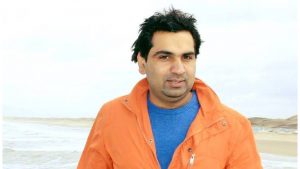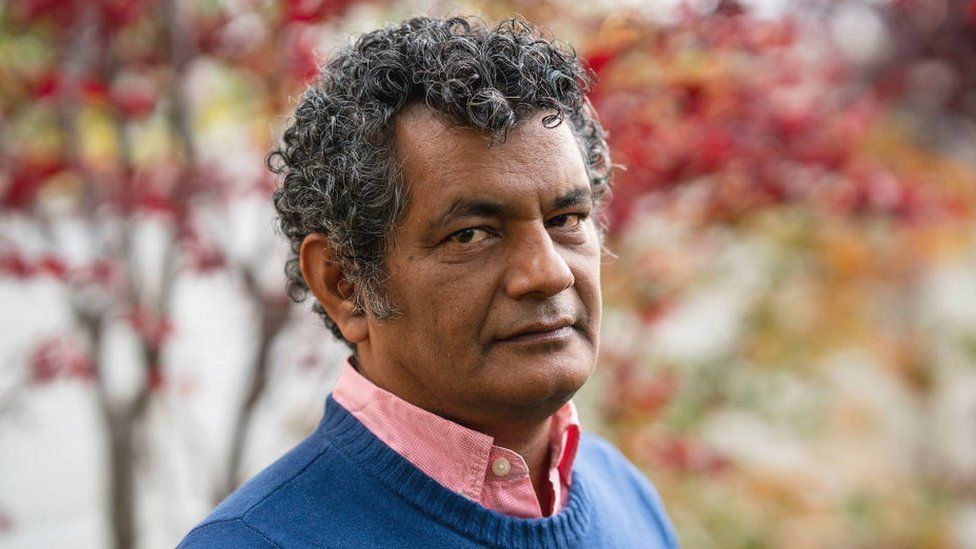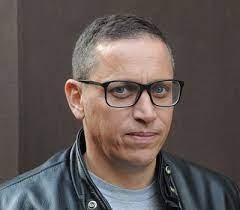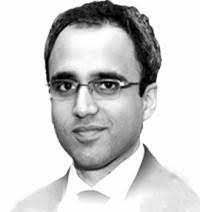
- Conversations
Writing fiction in a dystopian world – A conversation with Mohammed Hanif

Francesca Recchia (FR): Hello, this Francesca Recchia and I would like to welcome you to a new episode of The Polis Project’s Conversation Series. I’m very excited to have with us today Mohammad Hanif, a Pakistani writer and journalist. He is the author of the critically acclaimed book, A Case of Exploding Mangoes which won the Commonwealth Prize for the best book, while his second book, Our Lady of Alice Bhatti won the Wellcome Book Prize. Besides fiction and journalism, he has also written for cinema, theatre and he has written an opera. Thank you so much Mohammad Hanif, it is a real honor to have you with us.
Mohammad Hanif (MH): Thanks for having me.
FR: We are living really unprecedented times with a global pandemic that in lulls and waves seems to go on indefinitely. In your work the question of human fragility is always present. How do we write about these times? How and what kind of writing can help us make sense of what is going on in the present?
MH: I think it is too early to talk about that. We are still living in it and lots of people have suffered a lot of personal tragedies. There is not a month that goes by without finding out that somebody who was either very close to me or was known to me or somebody whose work I have followed have passed away. So, it is a time for grief, but it is also time to reflect. Because of the lockdown we have been given this opportunity to reflect on our privileges, to think about our place in the world, to talk to people that have not been able to because we were busy doing other things. It is the kind of writing that happens during times of war where lots of things that you had not noticed before are suddenly there in front of you. I really can’t say what kind of writing will come out of this pandemic, but I hope it is radically different from what was happening before. My fear is that we will probably shrug it off, forget about people who are gone, who are still suffering and completely lose track of people who have lost their jobs, who have lost their homes and have become even more vulnerable as a result of this pandemic. And we will start pretending that the world has gone back to normal – as if normal was something that we needed to aspire to.
FR: This idea of going back to normality is fairly terrifying because in many ways it is just sanctioning the status quo as some sort of an ideal place to be.
MH: Yes. There were a lot of us for whom “normal” was to enjoy our privileges, to be able to travel freely and to be able to go to places that we wanted to go to without even thinking. Some of the things we considered normal were completely ridiculous, some of them were unnecessary and were causing a lot of damage to the world that we live in. But a lot of us actually did believe that this was normal and there is an aspiration to get back to that — which, as you said, is quite terrifying.
FR: To deal with this terrifying dimension, in your works of fiction there is always some kind of an absurd or fantastical dimension that seamlessly folds into reality. Is this a way to come to terms with difficult situations or extraordinary historical circumstances and, if so, how does that work?
MH: I wish I knew how that works because then I would make it work every time! Because every time it is a struggle and you forget how it was done last time. My guesswork is – and it is only a guess, it is not a well thought out explanation – that we live in times where things are completely crazy and make no sense even according to the rules of the status quo, [we think] that these things cannot be really happening. Next day you wake up and that thing has already happened and before you can digest that and, as you are going through that process of acceptance, you see something else. At the same time, you are trying to create something and the idea there is that you can just slightly get away from your day to day horrors and deal with them on a page in a fictional framework. You sit in a corner and try to make up a world of your own, which to you makes slightly more sense than the real world outside. But then you wake up again and you see the headlines and think: “I actually cannot keep up with this.” I think some novelists go through this phase in the middle of writing a story when they get fed up with it and say: “Who are these people? Where did they come from?” As you covered it in the past, the Supreme Court of Pakistan had been hearing appeals against massive, horrendous evictions in Karachi and there was hope that when this case goes to the highest Court they will see what is happening in the city. I still remember reading the headlines the next day: the Court ruled against these people’s protest, they said that these people must be thrown out of their houses where they have lived, in some cases, for more than fifty years. And [the judge] said: Who are these people? Where did they come from?” Instead of going into judiciary and becoming the top judge, this man should have probably stayed home and written a novel and he’d still be dealing with the same question. But then he will be just killing off people on a page and not in real life. Sometimes you deal with situations like this where you don’t know who is creating bigger fiction – a novelist sitting at his home or a judge sitting in a Court and deciding people’s fate without even hearing their stories.
FR: The consequence of fictional stories told by a judge are very different from the consequences of the fictional stories told by a writer.
MH: No writer has the urge to kill their characters and put them in horrible situations, but they know this is happening within a page and maybe at heart they are oppressors and want to act out some of those fantasies. Some of them do cause damage in real life as well. But in the end, you are trying to work out your own madness on a page that you hope somebody will read and enjoy. But then, we have people in journalism who churn out fictions, which create havoc for people; we have judges and lawyers who create fiction that makes people homeless and it’s all considered legal.
FR: Who gives the right to create those fictions?
MH: I think I have to fight for that right. It’s a privilege, but I have to fight for it. I have to shout louder. I still demand that I should have the right to tell my own story even if it is based on total lies and if it only happened in my head. But I think I have the right to exercise that freedom. And as a writer you have to fight for that freedom every day with yourself and then with your imagination, with the limits of your imagination and the limits that society puts on you.
But there is a fiction that Power creates and that seems to be the dominating fiction of our lives. I’m not one of those people who thinks that people who read books or write books are inherently better than those who don’t, because where do you see the greatest number of books? In a lawyer’s or in a judge’s room. They are made up of big, fat books and so you have some very well-read monsters. The point is that somebody sitting in a position of power or privilege creates their own fiction and that seems to be the dominant narrative of our lives.
FR: Those fictions are very powerful because they are also self-fulfilling in many ways.
MH: I think there is a part of me that wants to hold on to that belief, otherwise why would one sit down every day to try to create fiction if one didn’t believe that there was some power in it? But I’m talking about the kind of power that convinces large segment of population that actually these people are illegal. Who are these people? Why did they even think that they have the right to a roof over their head? I’m talking about that kind of fiction that our power elite has created.
I live in Karachi and just two streets from here there is a posh street which is full of Karachi’s most expensive restaurants and galleries. These people were served notices a couple of years ago, but even that day when I heard about the notices, I knew that this [eviction] was never going to happen. Nobody is ever going to evict them and that is the power of that fictional world, which is way more real and cruel than anything a novelist like me can come up with. But that is the truth of our lives. That street is still intact and will remain intact. Although by every law it is illegal.
I worry about that kind of power they create. How can this place go? The gallery is so beautiful. How does it matter if it’s legal or illegal? A lot of people like us who like to go to galleries and read books or do podcasts, buy into that narrative that this is a beautiful thing, why destroy it?
FR: The question of language is very powerful because a gallery maybe illegal but it will never be an encroachment. The words we use to describe the same phenomenon depending on who is the protagonist are very different and that conscious or unconscious choice is symptomatic of how certain fictions work.
MH: Yes, on one side I have this street which is illegal, but nobody will say that it is illegal. The other side, I have the sea and every single building that is built on the sea is illegal. The land didn’t even exist. They reclaimed the sea and built themselves posh apartments. But on the same beach there are people who run small businesses — somebody sells balloons, somebody sells snacks, somebody gives camel rides and every few weeks the Police chase them because they think that somebody who is selling a kite or a balloon for twenty rupees is a criminal. But somebody who has bought a flat there for millions and millions of rupees is obviously legal. How can anything be wrong if so much money is exchanging hands? So, I wonder whether fiction created by people like me has any relevance in this kind of environment.
FR: Still, in your work you often deal with themes that people are either too scared or too wary to face or address. I’m thinking for example of the question of minorities in Pakistan in Our Lady of Alice Bhatti, the trauma of war in Red Birds or the issue of death penalty in your recent script for a shadow puppetry performance Before the Sun Comes Up with The Justice Project Pakistan. How do you decide to address those themes? Do you feel a certain civic or intellectual responsibility that drives you to address these political topics that are often untouched?
MH: I would like to believe that I do feel some kind of responsibility, but if I really felt that responsibility then I would be doing something more and sometimes I do try. I’m a journalist as well and I think journalism is a far better medium to address those kinds of concerns. Even better is that you go to Karachi Press Club, join a demonstration, throw some fire crackers or raise some slogans, shame some people, confront them.
When it comes to writing novels or any piece of fiction, it is slightly more complex because you are also trying to deal with your own demons. You are also trying to create a world, which has been quite disappointing: I always start out with the hope that I can build a world that makes more sense than the real world and that is probably more forgiving. But I always end up bringing that real world into my fictional world. So, civic duty is not the first concern that drives me to write a novel.
I think it is a more selfish urge. It’s almost like withdrawing from that real world because you are either too lazy or too vulnerable to confront it directly. You do your journalism and your shouting and then you withdraw into your corner and create a little world of your own where you hope that you can live for a few years – because that’s how long it takes me to write a novel. And these concerns that you mentioned like minorities come into novels because you’re thinking of characters, of their lives and that is it that interests you and sometimes those characters in their fictional lives have to face those issues. Because you are trying to stay faithful to a character or are trying to make a world function, some of those things will actually creep into your fiction. I have tried writing a novel where nothing bad ever happens, but I have failed.
FR: You work across a multiplicity of genres, registers and imagination. I’m really curious, how do you choose what to write in which form?
MH: I think one has to make a living so what one does whatever one can. I haven’t figured it out myself. Sometimes I write for foreign newspapers and they are always concerned about the bigger things, which I’m not very good at. So, I’ll look at something which is personal and small and try and reflect on that. And since it happens to be in English, some explanation or more context is involved. Then I write in Urdu, mostly journalism or sometimes I have written plays, one film — there, the nice thing is that you don’t have to keep explaining things. You write a line and people will know the history. Similarly, I have been writing in Punjabi, which is my mother tongue and I am pleased with that. That’s where you have to do the minimum effort because it is like talking to your own mother and family. It is also liberating – because you are using their language, their idiom, something you grew up with – in the language that you speak. I might be exaggerating, but that’s how I feel about it.
FR: Speaking of language and your work travelling across languages, I would like to discuss the controversy that happened around the Urdu translation of The Case of Exploding Mangoes. It was written in 2008 and translated into Urdu in 2020 and just to paraphrase you, we could say that it took the military more than a decade to get the joke?
MH: I was quoting a publisher who had refused to publish the translation and I think he was wise because I was feeling quite smug since the book had been around for ten, eleven years. People close to me did worry about the kind of reaction this book would get. And it got nothing but love and praise so I thought: “There is no problem, let’s publish it.” I had a very nice publisher who published it with lots of love and care and it was a brilliant translation by a journalist friend who is also a novelist and a poet – Kashif Raza. And the book was out for about six months so there was no controversy.
So, let’s not call it a controversy, it was a straight midnight raid by Pakistan intelligence agencies on the publishing house and a couple of bookshops where they took away all the copies. They did not give us any reasons. They said that these were their orders. We made some noise about this on social media and the media because it was a new thing. Till that time, and even now, it is very rare in Pakistan, where there is lot of control over the media and journalists are being either fired or abducted, publishing has been relatively safe. So, after this raid happened and we made some noise — people who had carried out the raid were actually hurt. They got back to us saying that they actually did not harm or arrest anyone, expecting that we should be actually grateful to them. And in a way I am, when I look around at my friends, journalists or writers who have suffered much worse fates. In this case they only disappeared my book. I have friends who have disappeared, and we haven’t heard about them in years. So, I guess they are right: one should be grateful.
FR: Is this a sign of the times that an intelligence agency decides to go after a novel? What do these actions do to the intellectual climate of a country?
MH: I did ask them what happened — you seem like intelligent guys and are definitely from an intelligence agency. So, the first sign is that these things are being run by some very stupid people because what exactly are they trying to achieve by disappearing a book? This is a sign of times that even our intelligence services are being run by people, who are not intelligent at all. But then it is also a bit scary if these people are deciding our fates — who gets to write and who doesn’t get to write; who can walk around freely and who can’t.
FR: In September last year there was the Criminal Law Amendment Bill and there was the insertion of an article in the Pakistan Penal Code Act of 1860 that says that whomever intentionally ridicules, brings into dispute or defames the Armed Forces or members of the Armed Forces shall be guilty of the offence and this offence is punishable with up to two years of imprisonment and a fine of half a million rupees or both of them combined. What are the implications of pieces of law like this?
MH: I think if this law is actually applied, it will apply to half of our retired and serving generals because they are the ones who are symbols of everything that is ridiculous in our discourse. They say some of the most idiotic thing that we then suffer the consequences of. So, I think it is another scare tactic. They don’t really need a law. They have abducted hundreds of people, whom they thought were challenging their authority or ridiculing them. So, I think they just want a legal front to do what they have already been doing. But as I said if this law was properly implemented in spirit, then I think half of them will be serving those sentences themselves.
FR: This is unfortunately not what happens. So, what are the consequences of all this on the shrinking spaces of freedom of expression in Pakistan?
MH: There used to be a time, only few years ago, when you thought that you can always find a little corner where a hundred people can get together and they can talk about something and even that is being snatched from us. There used to be this comfort: that if you are not allowed on TV or allowed to write in newspapers or if there is a certain story that you can’t report for local media because there is a lot of pressure on them, you could at least write a novel or for a foreign paper.
So, there is a very clear message that’s being sent out. We are being made to realize that we don’t have any venues to confront some of these idiotic things that are being done. What’s happening is that they want to invade our heads and sit there and warn us to not even have a thought they don’t like. The new kind of censorship in Pakistan is not that you can’t say this or you can’t say that — no, you have to say this. I mean, my journalist colleagues who work in TV, they get WhatsApp messages with properly written scripts and that’s what they have to say. The next step is that even if there is somebody sitting in a corner thinking something, they should have some kind of mechanism that even if I think something which they don’t like, I should be scared. The end result is always that you have to be very, very scared even if you are writing. You’re expected to sit there and think if I write this, will it have consequences?
FR: Is self-censorship the result of this massive political strategy of silencing dissent?
MH: It is an old-fashioned term and I wish I could come up with something fancy. I think there should be another term rather than self-censorship because when people are scared that whatever they are thinking might bring harm to their families and their loved ones and to themselves, I think it is something more existential than just plain old self-censorship. We have always had some kind of self-censorship. We know what the borders are. We know where the lines are – we usually respected them and sometimes pushed them. But here they are trying to draw that line in our heads.
FR: What do you think is the way forward?
MH: I think [the way forward is] to get up every day and find new ways to resist them, to ridicule them and like a saying in my native tongue goes, you have to dig a well everyday and drink from it. There is no running water in my house but that is another issue! But literally and intellectually if you have to survive here, either you go away — which is a privilege that most people don’t have — or you shut up – which, again, is not a choice for a lot of people. So, every day you have to dig a new well and find a new way to resist.
FR: This a wonderful way to conclude. Do you have anything else that you would like to add?
MH: No. Thank you! Thanks for having me. It was nice talking to you.





